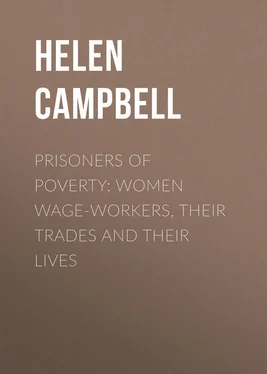Helen Campbell - Prisoners of Poverty - Women Wage-Workers, Their Trades and Their Lives
Здесь есть возможность читать онлайн «Helen Campbell - Prisoners of Poverty - Women Wage-Workers, Their Trades and Their Lives» — ознакомительный отрывок электронной книги совершенно бесплатно, а после прочтения отрывка купить полную версию. В некоторых случаях можно слушать аудио, скачать через торрент в формате fb2 и присутствует краткое содержание. ISBN: , Жанр: foreign_antique, foreign_prose, на английском языке. Описание произведения, (предисловие) а так же отзывы посетителей доступны на портале библиотеки ЛибКат.
- Название:Prisoners of Poverty: Women Wage-Workers, Their Trades and Their Lives
- Автор:
- Жанр:
- Год:неизвестен
- ISBN:http://www.gutenberg.org/ebooks/34060
- Рейтинг книги:3 / 5. Голосов: 1
-
Избранное:Добавить в избранное
- Отзывы:
-
Ваша оценка:
- 60
- 1
- 2
- 3
- 4
- 5
Prisoners of Poverty: Women Wage-Workers, Their Trades and Their Lives: краткое содержание, описание и аннотация
Предлагаем к чтению аннотацию, описание, краткое содержание или предисловие (зависит от того, что написал сам автор книги «Prisoners of Poverty: Women Wage-Workers, Their Trades and Their Lives»). Если вы не нашли необходимую информацию о книге — напишите в комментариях, мы постараемся отыскать её.
Prisoners of Poverty: Women Wage-Workers, Their Trades and Their Lives — читать онлайн ознакомительный отрывок
Ниже представлен текст книги, разбитый по страницам. Система сохранения места последней прочитанной страницы, позволяет с удобством читать онлайн бесплатно книгу «Prisoners of Poverty: Women Wage-Workers, Their Trades and Their Lives», без необходимости каждый раз заново искать на чём Вы остановились. Поставьте закладку, и сможете в любой момент перейти на страницу, на которой закончили чтение.
Интервал:
Закладка:
There is at present on Third Avenue a Mrs. F – , who for eleven years has conducted a successful business built upon continuous fraud. She is a manufacturer of underwear, and the singular fact is that she has certain regular employees who have been with her from the beginning, and who, while apparently unconscious of her methods, are practically partners in the fraud. She is a woman of good presence and address, and one to whom girls submit unquestioningly, contending, even in court, that she never meant to cheat them; and it is still an open question with those who know her best how far she herself recognizes the fraud in her system. The old hands deny that it is her custom to cheat, and though innumerable complaints stand against her, she has usually paid on compulsion, and insisted that she always meant to. Her machines never lack operators, and the grade of work turned out is of the best quality. Her advertisement appears at irregular intervals, is answered by swarms of applicants, and there are always numbers waiting their turn. On a side street a few blocks distant is a deep basement, crowded with machines and presided over by a woman with many of her personal characteristics. It is the lowest order of slop work that is done here, but it helps to fill the bargain counters of the poorer stores, and the workers are an always shifting quantity. It is certain that both places are practically the property of Mrs. F – , but no man has yet been cunning enough to determine once for all her responsibility, and no law yet framed covers any ground that she has chosen as her own. Her prototypes are to be found in every trade open to women, and their numbers grow with the growth of the great city and strengthen in like proportion. The story of one is practically the story of all. Popularly supposed to be a method of trickery confined chiefly to Jews, investigation shows that Americans must share the odium in almost as great degree, and that the long list includes every nationality known to trade.
We have dealt thus far with fraud as the first and chief procurer for bargain counters. Another method results from a fact that thus far must sum up as mainly Jewish. Till within very little more than a year, a large dry-goods firm on the west side employed many women in its underwear department. The work was piece-work, and done by the class of women who own their own machines and work at home. Prices were never high, but the work was steady and the pay prompt. The firm for a time made a specialty of “Mother Hubbard” night-gowns, for which they paid one dollar a dozen for “making,” this word covering the making and putting in of yoke and sleeves, the “seamer” having in some cases made the bodies at thirty cents a dozen. Many of the women, however, made the entire garment at $1.30 per dozen, ten being the utmost number practicable in a day of fourteen hours. Suddenly the women were informed that their services would not be required longer. An east-side firm bearing a Jewish name had contracted to do the same work at eighty cents a dozen, and all other underwear in the same proportions. Steam had taken the place of foot-power, and the women must find employment with firms who were willing to keep to slower methods. Necessarily these are an always lessening minority. Competition in this race for wealth crushes out every possibility of thought for the worker save as so much producing power, and what hand and foot cannot do steam must. In several cases in this special manufacture the factories have been transferred to New Jersey and Pennsylvania, where rent is a mere song, and where girls flock in from the adjacent country, eager for the work that represents something higher than either ordinary mill work or the household service they despise.
“What can we do?” said one manufacturer lately, when asked how he thought the thing would end. “If there were any power quicker than steam, or any way of managing so that women could feed five or six machines, that would have to come next, else every one of us would go to the wall together, the pressure is so tremendous. Of course there’s no chance for the women, but then you must remember there’s precious little chance for the employer either. This competition is a sort of insanity. It gluts the market with cheap goods, and gives a sense of prosperity, but it is the death of all legitimate, reasonable business. It won’t surprise me if this whole trade of manufacturing underwear becomes a monopoly, and one man – like O’H – , for instance – swallows up the whole thing. Lord help the women then, for there’ll be no help in man!”
“Suppose co-operation were tried? What would be the effect?”
“No effect, because there isn’t confidence enough anywhere to make men dare a co-operative scheme. Even the workers would distrust it, and a sharp business man laughs in your face if you mention the word. It doesn’t suit American notions. It might be a good thing if there were any old-fashioned business men left, – men content with slow profits and honest dealing, – as my father was, for instance. But he wouldn’t have a ghost of a chance to-day. The whole system of business is rotten, and there will have to be a reconstruction clean from the bottom, though it’s the men that need it first. We’re the maddest nation for money on the face of the earth, and the race is a more killing one every year. I’m half inclined to think sometimes that mankind will soon be pretty much a superfluity, the machines are getting so intelligent; and it may be these conditions that seem to upset you so are simply means of killing off those that are not wanted, and giving place to a less sensitive order of beings. Lord help them, I say again, for there’s no help in man.”
The speaker nodded, as if this rather unexpected flight of imagination was an inspiration in which might lie the real solution of all difficulties, and hurried away to his waiting niche in the great competitive system. And as he went, there came to me words spoken by one of the workers, in whose life hope was dead, and who also had her theory of any future under to-day’s conditions: —
“I’ve worked eleven years. I’ve tried five trades with my needle and machine. My shortest day has been fourteen hours, for I had the children and they had to be fed. There’s not one of these trades that I don’t know well. It isn’t work that I’ve any trouble in getting. It’s wages. Five years ago I could earn $1.50 a day, and we were comfortable. Then it began to go down, – $1.25, then $1.00. There it stopped awhile, and I got used to that, and could even get some remains of comfort out of it. I had to plan to the last half cent. We went cold often, but we were never hungry. But then it fell again, – to ninety cents, to eighty-five. For a year the best that I can do I have earned not over eighty cents a day, – sometimes only seventy-five. I’m sixty-two years old. I can’t learn new ways. I am strong. I always was strong. I run the machine fourteen hours a day, with just the stoppings that have to be to get the work ready. I’ve never asked a man alive for a penny beyond what my own hands can earn, and I don’t want it. I suppose the Lord knows what it all means. It’s His world and His children in it, and I’ve kept myself from going crazy many a time by saying it was His world and that somehow it must all come right in the end. But I don’t believe it any more. He’s forgotten. There’s nothing left but men that live to grind the face of the poor; that chuckle when they find a new way of making a cent or two more a week out of starving women and children. I never thought I should feel so; I don’t know myself; but I tell you I’m ready for murder when I think of these men. If there’s no justice above, it isn’t quite dead below; and if men with money will not heed, the men and the women without money will rise some day. How? I don’t know. We’ve no time to plan, and we’re too tired to think, but it’s coming somehow, and I’m not ashamed to say I’ll join in if I live to see it come. It’s seas of tears that these men sail on. It’s our life-blood they drink and our flesh that they eat. God help them if the storm comes, for there’ll be no help in man.”
Читать дальшеИнтервал:
Закладка:
Похожие книги на «Prisoners of Poverty: Women Wage-Workers, Their Trades and Their Lives»
Представляем Вашему вниманию похожие книги на «Prisoners of Poverty: Women Wage-Workers, Their Trades and Their Lives» списком для выбора. Мы отобрали схожую по названию и смыслу литературу в надежде предоставить читателям больше вариантов отыскать новые, интересные, ещё непрочитанные произведения.
Обсуждение, отзывы о книге «Prisoners of Poverty: Women Wage-Workers, Their Trades and Their Lives» и просто собственные мнения читателей. Оставьте ваши комментарии, напишите, что Вы думаете о произведении, его смысле или главных героях. Укажите что конкретно понравилось, а что нет, и почему Вы так считаете.












